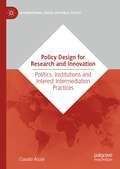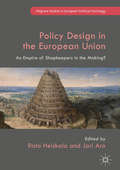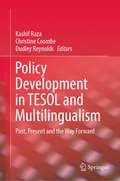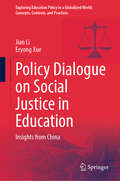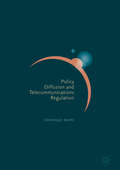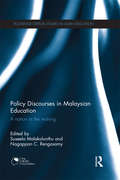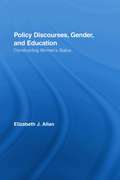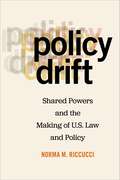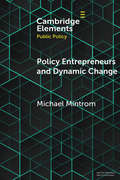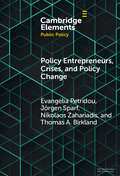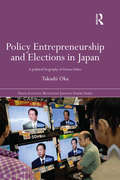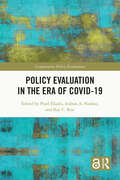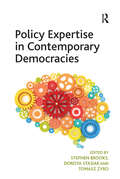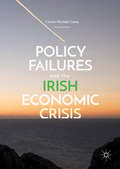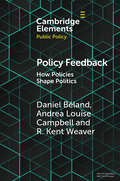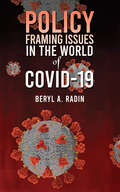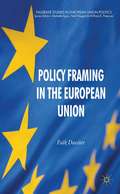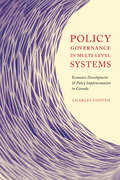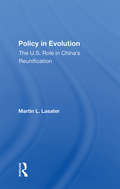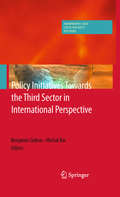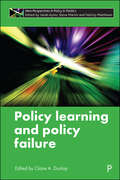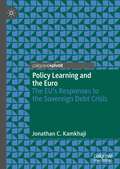- Table View
- List View
Policy Design for Research and Innovation: Politics, Institutions and Interest Intermediation Practices (International Series on Public Policy)
by Claudia AcciaiThis book investigates the determinants of policy design choices in an area of public policy embracing multiple sectors of public responsibilities: Research and Innovation (R&I). Drawing on case studies from France and Italy, it assesses how governments design research and innovation policy strategies. It also examines how policymakers and stakeholders translate their interests into different design strategies, and the impact of varying political orientations and institutional setups on shaping choices for alternative policy instruments. Lastly, the book considers how the interactions between policy makers and policy takers influence policy design choices. It will appeal to scholars and students of comparative public policy, public administration, emerging technologies, and governance.
Policy Design in the European Union: An Empire of Shopkeepers in the Making? (Palgrave Studies in European Political Sociology)
by Risto Heiskala Jari AroThis edited collection addresses a paradox at the heart of the European Union: if it is a constantly enlarging empire of governance, how can almost thirty member states design policies as an administrative whole, whilst narrowly approaching all political issues from one economic point of view? The contributors to this collection approach this by studying knowledge production, policy formation and policy implementation in the union. The topics covered include the history of the union, its nature as an empire in the making compared to historical successors as well as current USA and China, formation of union level statistical data and policy documents, paradoxes of fiscal governance, social innovation policy, youth and education policy, energy policy and foreign policy with particular regard to Russia. The concluding chapter outlines five alternative future scenarios for the union extending from collapse and marginalization to the emergence of a federal empire. The book is essential reading for anybody interested in the EU, including students and scholars across a range of disciplines, including sociology, political science, international relations, economics, management studies, public and social policy, science and technology studies, and environmental policy.
Policy Development in TESOL and Multilingualism: Past, Present and the Way Forward
by Christine Coombe Kashif Raza Dudley ReynoldsThe book is of interest to scholars of multilingualism, language teachers, researchers, and administrators who are developing policies on teaching English and promoting multilingualism. Given its scope, this edited collection provides an overview of how multilingualism is transforming the practice of Teaching English to Speakers of Other Languages (TESOL) in diverse contexts around the world. It serves as a platform for discussions related to policy enactment where TESOL and multilingualism are viewed as collaborative endeavours and approaches the topic from three different angles. The first section of the book provides critical examinations of previous initiatives and accomplishments in the area of language policy development and implementation. The second section describes current projects and initiatives intended to expand and strengthen the field of TESOL while providing space for local and indigenous languages to develop. The third and last part of the book highlights policy development areas that need special consideration in order to develop a form of TESOL that builds on and contributes to multilingualism.
Policy Dialogue on Social Justice in Education: Insights from China (Exploring Education Policy in a Globalized World: Concepts, Contexts, and Practices)
by Jian Li Eryong XueThis book explores multiple policy dialogues on social justice in education from China’s perspectives. It examines social justice in education in China in various aspects, including the educational policy equity reform of college entrance examinations, social justice in educational policy reform on special enrollment plans, social justice in the education policy reform of ethnic students’ extra scores, social justice in the education policy reform of ethnic basic education, and social justice in school development within districts and counties. This book showcases a comprehensive landscape of China’s education policy dialogues and discusses both the challenges of, and strategies for, enhancing social justice in education in China.
Policy Diffusion Dynamics in America
by Graeme BousheyPolicy Diffusion Dynamics in America integrates research from agenda setting and epidemiology to model factors that shape the speed and scope of public policy diffusion. Drawing on a data set of more than 130 policy innovations, the research demonstrates that the "laboratories of democracy" metaphor for incremental policy evaluation and emulation is insufficient to capture the dynamic process of policy diffusion in America. A significant subset of innovations trigger outbreaks - the extremely rapid adoption of innovation across states. The book demonstrates how variation in the characteristics of policies, the political and institutional traits of states, and differences among interest group carriers interact to produce distinct patterns of policy diffusion.
Policy Diffusion and Telecommunications Regulation
by Véronique WavreThis study investigates regulatory reforms in the telecommunications sector of Middle Eastern and North African (MENA) countries. It explores telecommunications innovations in three developing economies (Morocco, Jordan and Egypt), with a focus on regional and European trends in telecommunications policies. Common knowledge suggests that the European Union and its member states are the main influential regulatory power in the MENA region. However, the empirical analysis of selected telecommunications regulations: universal service obligation (USO) and spectrum management, reveals that reforms are not always determined by European countries but may also originate from other developing countries, such as Peru and Chile. This finding attests to the rise of regulatory influence from the Global South, which challenges traditional transfers of regulations originating from more industrially advanced countries.
Policy Discourses in Malaysian Education: A nation in the making (Routledge Critical Studies in Asian Education)
by Suseela Malakolunthu Nagappan C. RengasamySince independence in 1957, Malaysia has become a globally-recognised industrial trading partner. With a 60% Muslim population, it also enjoys the reputation of being a moderate and peaceful nation. However, with just a short time left to realising its Vision 2020 of developed nationhood, the pathway of nation building still seems ambiguous. There is a brewing tension in its race and ethnic relations which has permeated the various fronts, namely politics, society, economics and education. This book analyses the education policies that have been formulated and implemented in Malaysia since independence. It demonstrates how these policy enactments have influenced the nation’s growth and transformation, and the challenges faced in creating a model of equity and multicultural co-existence among its racially and ethnically diversified people. Shedding light on these issues, it points towards the major mending that is needed for Malaysia to become a truly developed nation. Chapters include: Education of ethnic minorities in Malaysia: Contesting issues in a multiethnic society Access and equity issues in Malaysian higher education Graduate employability in government discourse: A critical perspective This comprehensive book is a case study on Malaysia that will supplement researchers and advance students in their understanding of a multi-racial society’s perspective and attitude towards education.
Policy Discourses, Gender, and Education: Constructing Women's Status (Routledge Research in Education)
by Elizabeth J. AllanDespite over thirty years of activism and legislation to eliminate discrimination, parity has yet to be achieved for women in academe. This book describes policy discourse analysis as a framework for considering how those involved in policy-making efforts may make use of discourses that inadvertently undermine the intended effect of the policies they set forth. Allan illustrates the methods of policy discourse analysis by describing their use in a study of twenty-one women's commission reports. In so doing, she highlights the important work of university women's commissions while uncovering policy silences and making visible the powerful discourses framing gender equity policy initiatives in higher education. Her findings reveals how dominant discourses of femininity, access, professionalism, race, and sexuality contribute to constructing women's status in complex and at times, contradictory ways. This important volume will interest researchers across a number of disciplines including policy studies, educational leadership, higher education and cultural studies of education.
Policy Drift: Shared Powers and the Making of U.S. Law and Policy
by Norma M. RiccucciThe role of formal and informal institutional forces in changing three areas of U.S. public policy: privacy rights, civil rights and climate policyThere is no finality to the public policy process. Although it’s often assumed that once a law is enacted it is implemented faithfully, even policies believed to be stable can change or drift in unexpected directions. The Fourth Amendment, for example, guarantees Americans’ privacy rights, but the 9/11 terrorist attacks set off one of the worst cases of government-sponsored espionage. Policy changes instituted by the National Security Agency led to widespread warrantless surveillance, a drift in public policy that led to lawsuits challenging the constitutionality of wiretapping the American people. Much of the research in recent decades ignores the impact of large-scale, slow-moving, secular forces in political, social, and economic environments on public policy. In Policy Drift, Norma Riccucci sheds light on how institutional forces collectively contributed to major change in three key areas of U.S. policy (privacy rights, civil rights, and climate policy) without any new policy explicitly being written. Formal levers of change—U.S. Supreme Court decisions; inaction by Congress; Presidential executive orders—stimulated by social, political or economic forces, organized permutations which ultimately shaped and defined contemporary public policy.Invariably, implementations of new policies are embedded within a political landscape. Political actors, motivated by social and economic factors, may explicitly employ strategies to shift the direction of existing public polices or derail them altogether. Some segments of the population will benefit from this process, while others will not; thus, “policy drifts” carry significant consequences for social and economic change. A comprehensive account of inadvertent changes to privacy rights, civil rights, and climate policy, Policy Drift demonstrates how unanticipated levers of change can modify the status quo in public policy.
Policy Entrepreneurs and Dynamic Change (Elements in Public Policy)
by Michael MintromPolicy entrepreneurs are energetic actors who engage in collaborative efforts in and around government to promote policy innovations. Interest in policy entrepreneurs has grown over recent years. Increasingly, they are recognized as a unique class of political actors, who display common attributes, deploy common strategies, and can propel dynamic shifts in societal practices. This Element assesses the current state of knowledge on policy entrepreneurs, their actions, and their impacts. It explains how various global forces are creating new demand for policy entrepreneurship, and suggests directions for future research on policy entrepreneurs and their efforts to drive dynamic change.
Policy Entrepreneurs, Crises, and Policy Change (Elements in Public Policy)
by Nikolaos Zahariadis Evangelia Petridou Jörgen Sparf Thomas BirklandIncreasingly, policymaking takes place while extraordinary events threaten fundamental societal values. During turbulent times, policy entrepreneurs emerge as pivotal figures. They are energetic actors who pursue dynamic change in public policy and, whereas we know much about how they promote innovation and change in normal policymaking, we know less about how they behave in crises, and even less about how different crises influence policy entrepreneurial action. This Element focuses on interaction between policy entrepreneurs and crises. It analyzes policy entrepreneurial action in six case studies – three fast-burning and three creeping crises – to ascertain policy entrepreneurs' strategies and effectiveness during extraordinary events. It proposes crisis policy entrepreneurial strategies, a framework to understand outcomes based on policy entrepreneurial action and type of crisis and suggests avenues for further research on policy entrepreneurs and crises, including implications for crisis managers. This title is also available as Open Access on Cambridge Core.
Policy Entrepreneurship and Elections in Japan: A Political Biogaphy of Ozawa Ichirō (Nissan Institute/Routledge Japanese Studies)
by Takashi OkaOzawa Ichirō is one of the most important figures in Japanese politics, having held the positions of Chief Secretary of the Liberal Democrat Party and, after defection from the LDP, President of the Democratic Party of Japan. Ozawa has distinctive ideas that set him apart from the average Japanese politician, he believes in the concept of the independence of the individual, as opposed to the importance of the group, and as a policy entrepreneur he has had a huge impact on political change not only advocating but precipitating institutional change in a key political area – the election system. Using extensive interview data from key players in the political arena, this book examines Ozawa's struggle to normalize alternation in office between two competingpolitical parties – particularly significant given the results of the 2009 election which handed over power to the Democratic Party of Japan – and how he has used his entrepreneurial talents to precipitate and carry out institutional change. Not only a political biography, but also an in-depth analysis of the Japanese political and electoral systems, this book will be of huge interest to anyone interested in Japanese politics and electoral systems.
Policy Evaluation in the Era of COVID-19 (Comparative Policy Evaluation)
by Ray C. Rist Pearl Eliadis Indran A. NaidooDid evaluation meet the challenges of the COVID-19 crisis? How were evaluation practices, architectures, and values affected? Policy Evaluation in the Era of COVID-19 is the first to offer a broad canvas that explores government responses and ideas to tackle the challenges that evaluation practice faces in preparing for the next global crisis. Practitioners and established academic experts in the field of policy evaluation present a sophisticated synthesis of institutional, national, and disciplinary perspectives, with insights drawn from developments in Australia, Canada and the UK, as well as the UN. Contributors examine the impacts of evaluation on socioeconomic recovery planning, government innovations in pivoting internal operations to address the crisis, and the role of parliamentary and audit institutions during the pandemic. Chapters also example the Sustainable Development Goals, and the inadequacy of human rights-based approaches in evaluation, while examining the imperative proposed by some authors that it is time that we take seriously the call for substantial transformation. Written in a clear and accessible style, Policy Evaluation in the Era of COVID-19 offers a much-needed insight on the role evaluation played during this unique and critical juncture in history.
Policy Expertise in Contemporary Democracies
by Stephen Brooks Dorota StasiakIn the world of Wikipedia, blogging and citizen journalism where huge masses of information and the capability to disseminate opinions, thoughts and ideas is available at the click of a mouse what is the role and impact of political experts? The contributors to this insightful and original volume argue that across the western world in general, the political expert occupies as important a role today as at any time in the past. The ubiquity of information and the fact that the experts and the organizations to which they are affiliated may be viewed as having an ideological agenda has not diminished their role, influence or status. Governments and the media still rely on them for information and advice whilst organizations in civil society need them in order to provide the evidence, arguments and policy recommendations that are essential to having a voice in the public conversation. By examining how these policy experts and their think tanks continue to exert influence across a range of modern western democracies a better understanding of the role of policy expertise and an examination of how it may develop and evolve throughout the rest of the world is reached.
Policy Failures and the Irish Economic Crisis
by Ciarán Michael CaseyThis book seeks to understand why almost all commentators on the Irish economy were unprepared for the scale of the recent economic crisis. It analyses the public contributions from a broad range of observers, including domestic and international agencies, academics, the newspapers and politicians. This approach gives new insights into the analytical and institutional shortfalls that inhibited observers from recognising the degree of the risk. The book demonstrates that most commentators were either impeded in what they could say, or else lacked the expertise to challenge the prevailing view. The findings have significant implications for a broad range of institutions, particularly the media and the Oireachtas (the Irish Parliament).
Policy Feedback: How Policies Shape Politics (Elements in Public Policy)
by Andrea Louise Campbell R. Kent Weaver Daniel BélandAlthough the idea that existing policies can have major effects on politics and policy development is hardly new, the last three decades witnessed a major expansion of policy feedback scholarship, which focuses on the mechanisms through which existing policies shape politics and policy development. Starting with a discussion of the origins of the concept of policy feedback, this element explores early and more recent contributions of the policy feedback literature to clarify the meaning of this concept and its contribution to both political science and policy studies. After exploring the rapidly expanding scholarship on policy feedback and mass politics, this element also puts forward new research agendas that stress several ways forward, including the need to explain both institutional and policy continuity and change. Finally, the element discusses the practical implications of policy feedback research through a discussion of its potential impact on policy design. This title is also available as Open Access on Cambridge Core.
Policy Framing Issues in the World of COVID-19
by Beryl A. RadinThis book is a somewhat unusual depiction of a difficult policy issue. It transcends almost all boundaries because of its constant change and its movement across many different participants.It was found attached to a range of policy topics, methodologies and approaches. Some of these were familiar while others seemed new. Interest in this topic was exhibited across the globe and did not appear to be delivered along with a narrow political agenda.While researchers tended to re-examine classic public policy literatures (such as those dealing with implementation, federalism and budgeting) they did so by raising unusual issues. But this was not typical since analysts are likely to emphasize similarities rather than differences in settings.
Policy Framing in the European Union
by Falk DaviterExplores how the framing of issues on the EU agenda affects policy-making. In a study that traces the highly contested developments in biotechnology policy over twenty years, the book introduces the conceptual and theoretical tenets of policy framing and shows how this analytical lens offers a unique perspective on issues in EU policy-making.
Policy Governance in Multi-level Systems
by Charles ContehThe past two decades have witnessed dramatic shifts in public policy, with increasing complexity not only in the relationships between the state, society, and the private sector, but also in the interactions among various orders of government in places such as Canada, the United States, and the European Union. In Policy Governance in Multi-level Systems, Charles Conteh examines how these seismic structural changes have impacted the work of public organizations and how these organizations are responding to modifications in their operating environments. With an emphasis on Canada's controversial but resilient regional economic policy, Conteh focuses his study on four agencies - the Atlantic Canada Opportunities Agency, Western Economic Diversification Canada, FedNor, and FedDev - and their evolving policy portfolios and modes of operation in New Brunswick, Manitoba, northern Ontario, and southern Ontario. Drawing upon literature in public administration, urban and regional governance, as well as multi-level governance, Conteh offers a cutting-edge analysis of contemporary and emerging understandings of multi-level governance and regional development while acknowledging the historical context of policy and intellectual traditions. Combining a solid theoretical background with empirical depth and practical lessons from the field, Policy Governance in Multi-level Systems is an invaluable resource for policy analysts, policy makers, and practitioners in many tiers of government, business, and community leadership.
Policy Governance in Multi-level Systems: Economic Development and Policy Implementation in Canada
by Charles ContehThe past two decades have witnessed dramatic shifts in public policy, with increasing complexity not only in the relationships between the state, society, and the private sector, but also in the interactions among various orders of government in places such as Canada, the United States, and the European Union. In Policy Governance in Multi-level Systems, Charles Conteh examines how these seismic structural changes have impacted the work of public organizations and how these organizations are responding to modifications in their operating environments. With an emphasis on Canada's controversial but resilient regional economic policy, Conteh focuses his study on four agencies - the Atlantic Canada Opportunities Agency, Western Economic Diversification Canada, FedNor, and FedDev - and their evolving policy portfolios and modes of operation in New Brunswick, Manitoba, northern Ontario, and southern Ontario. Drawing upon literature in public administration, urban and regional governance, as well as multi-level governance, Conteh offers a cutting-edge analysis of contemporary and emerging understandings of multi-level governance and regional development while acknowledging the historical context of policy and intellectual traditions. Combining a solid theoretical background with empirical depth and practical lessons from the field, Policy Governance in Multi-level Systems is an invaluable resource for policy analysts, policy makers, and practitioners in many tiers of government, business, and community leadership.
Policy Implications Of International Graduate Students And Postdoctoral Scholars In The United States
by National Research Council of the National AcademiesPolicy Implications of International Graduate Students and Postdoctoral Scholars in the United States explores the role and impact of students and scholars on US educational institutions and the US economy. The nation has drawn increasingly on human resources abroad for its science and engineering workforce. However, competition for talent has grown as other countries have expanded their research infrastructure and created more opportunities for international students. The report discusses trends in international student enrollments, stay rates, and examines the impact of visa policies on international mobility of the highly skilled.
Policy In Evolution: The U.s. Role In China's Reunification
by Martin L LasaterThe reunification of Taiwan with China is one of the most important policy issues of our time. The issue has broad strategic, political, economic, and moral ramifications for the U.S., as well as for Chinese on both sides of the Taiwan Strait. The People's Republic of China (PRC) has assigned top political priority to reunification and has made the
Policy Initiatives Towards the Third Sector in International Perspective
by Benjamin Gidron Michal BarOver the past decade, the third sector has had tremendous growth worldwide in both size and importance. As many countries struggle to address this changing reality, many have adopted policy initiatives aimed at changing the ways the third sector is addressed. It is a complex process, involving different fields of practice, different levels of government, and different types of third sector organizations. The contributions to this timely volume detail the process as carried out in eight diverse countries: US UK, Canada, Hungary, Germany, Ireland, Israel, Japan, all of whom have recently enacted policy initiatives towards the third sector. The studies are comprehensive: from reviewing the current policy, enacting new laws, supervisory mechanisms, and modes of funding. Featuring a postscript from Helmut Anheier (UCLA School of Public Policy, Los Angeles, CA, USA and Hertie School of Governance, Berlin, Germany), the thorough analysis in this volume will provide a new understanding of the policy initiatives in the eight countries studied, as well as guiding principles for other countries that may implement such initiatives in the future. The resulting work will give researchers in sociology, social work, third sector research, and international economics a new framework for understanding the Third Sector: its role in society, and its relationships with government, the market, and the citizens of the country.
Policy Learning and Policy Failure (New Perspectives in Policy and Politics)
by Claire A. DunlopFirst published as a special issue of Policy & Politics, this updated volume explores policy failures and the valuable opportunities for learning that they offer. Policy successes and failures offer important lessons for public officials, but often they do not learn from these experiences. The studies in this volume investigate this broken link. The book defines policy learning and failure and organises the main studies in these fields along the key dimensions of processes, products and analytical levels. Drawing together a range of experts in the field, the volume sketches a research agenda linking policy scholars with policy practice.
Policy Learning and the Euro: The EU’s Responses to the Sovereign Debt Crisis
by Jonathan C. KamkhajiThis book analyzes the EU’s responses to the sovereign debt crisis that hit the Economic and Monetary Union (EMU) in 2010. After reviewing the events that led to the crisis, it examines two case studies. The first assesses the short-term policy changes by drawing on a new mechanism, contingent learning. The second case study revolves around the long-term EMU reforms passed during the period 2010-2013. More specifically, it assesses these responses in relation to the institutional scientific publications of the European Central Bank and the DG ECFIN of the Commission. By analyzing both the short and long-term responses to the sovereign debt crisis, the book elucidates how policy learning can be an effective engine for deeper European integration. It will be of interest to scholars and students of EU integration, the EMU, policy learning, and supranational bureaucracies.
